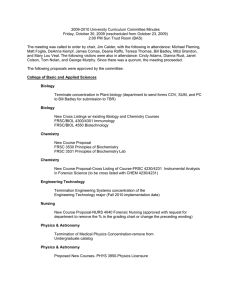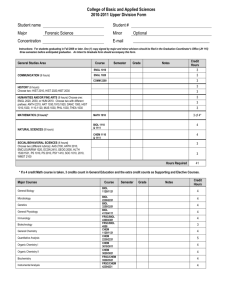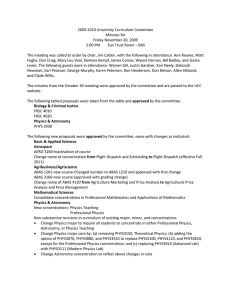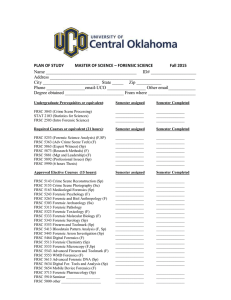The Financial Reporting Standards Council Rules and Procedures
advertisement
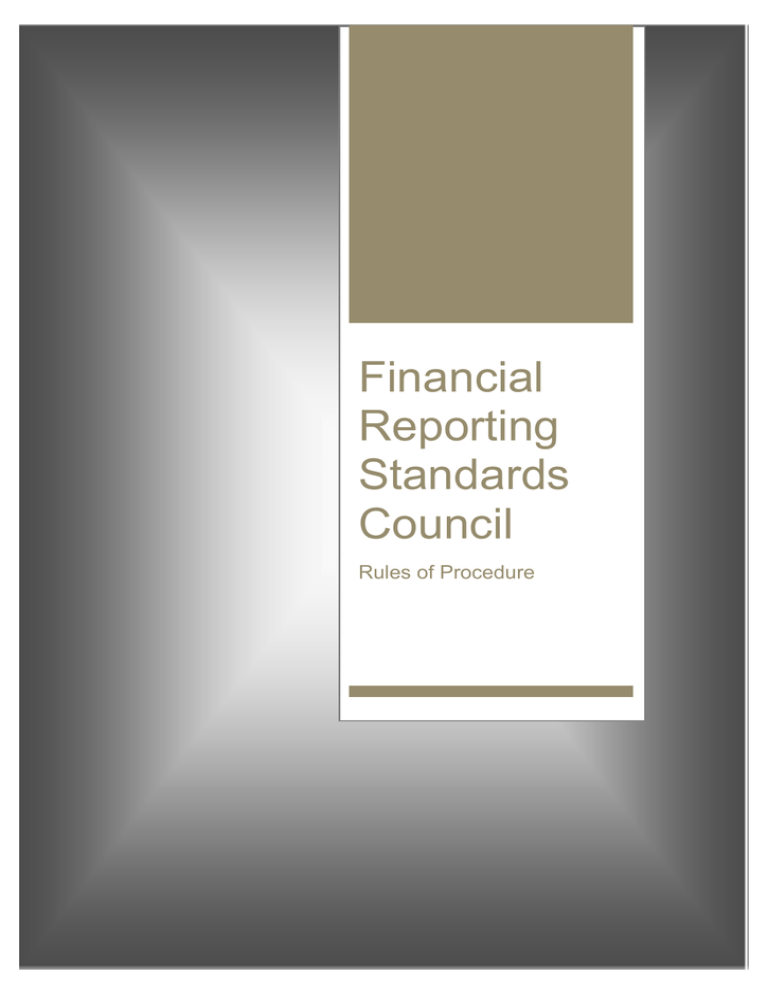
Financial Reporting Standards Council Rules of Procedure FRSC Rule of Procedure Table of Contents Introduction ................................................................................................................... 2 A. Due Process ............................................................................................................... 4 1. Introduction .............................................................................................................. 4 2. Development of Financial Reporting Pronouncements ...................................................... 4 3. Consultation .............................................................................................................. 4 4. Responses to Exposure Drafts ...................................................................................... 6 B. Administrative policies and procedures of the FRSC .................................................. 7 1. Appointments to the FRSC ........................................................................................... 7 2. Appointment of Proxies ............................................................................................... 7 3. Meetings ................................................................................................................... 7 4. Observers and Guests ................................................................................................. 9 5. Stakeholder relationships ............................................................................................ 9 6. Correspondence with Members of Standards-Setting Boards ............................................ 9 7. Representing the FRSC ............................................................................................. 10 8. Representation at other forums .................................................................................. 10 9. Confidentiality.......................................................................................................... 10 10. Conflicts of interest ................................................................................................. 10 1 FRSC Rule of Procedure Introduction The Financial Reporting Standards Council (FRSC) was formed in October 2011 and is the legally constituted financial reporting standard-setter for South Africa. Previously, the Accounting Practices Board, a private sector body consisting of a number of accounting and industry bodies, was empowered to issue accounting standards for use by South African companies. The Companies Act 71 of 2008 (Companies Act) imposes an obligation on the Minister of Trade & Industry (Minister) to establish a body known as the Financial Reporting Standards Council (FRSC). The FRSC has the following responsibilities as identified in section 204 of the Companies Act: • • • to receive and consider any relevant information relating to the reliability of and compliance with financial reporting standards and adapt international reporting standards for distinctive local circumstances; to advise the Minister of Trade and Industry on financial reporting standards matters; and to consult with the Minister on regulations establishing financial reporting standards. Regulation 27 to the Companies Act prescribes specific financial reporting standards to be applied by state owned entities, profit companies and non-profit companies based on factors such as public interest score, whether the entity is listed, and whether the financial statements are internally or independently compiled. These financial reporting standards include: • • • International Financial Reporting Standards (IFRS) as issued by the International Accounting Standards Board (IASB); International Financial Reporting Standards for Small and Medium-sized Entities (IFRS for SMEs) as issued by the International Accounting Standards Board (IASB); or Financial Reporting Standard as determined by the company for so long as no financial reporting standard is specified. In terms of section 204 of the Companies Act, the FRSC held the following view: • • • • In view of the obligations imposed on the Minister in terms of section 29(5)(b) of the Companies Act to ensure that all regulations issued by the Minister in the case of financial reporting standards for public companies are required to be in accordance with the international financial reporting standards (IFRS) of the International Accounting Standards Board (IASB) or its successor body, the obligation in section 204(a) can never apply to public companies; The obligation in section 204(a) of the Companies Act imposed on the FRSC to “adapt reporting standards for local circumstances” is therefore only applicable to entities which are not public companies as defined in the Companies Act; Any interpretation of section 204(read with section 29(4) and (5) of the Companies Act) to the contrary, will also amount to a direct contravention of IN4 of IFRS 1 ‘First-time Adoption of International Financial Reporting Standards’ and IAS 1 ‘Presentation of Financial Statements’, which could never have been the intention of the legislature; and Since the power of the Minister in terms of section 29(4) of the Companies Act to make regulations prescribing financial reporting standards is enabling only, there is no obligation on the Minister to do so and by implication, the Minister is not obliged to consider and approve each individual financial reporting standard. The FRSC is therefore not required to endorse or reject IFRS and IFRS for SMEs standards and interpretations as the Companies Act is prescriptive as to the compliance with these standards 2 FRSC Rule of Procedure for specific entities as discussed above. The FRSC does however have the power to issue financial reporting pronouncements (FRPs) which will take into account South African circumstances and issues not specifically addressed by IFRS. The FRSC may also issue FRPs where divergent practice has arisen. These FRPs may notcontradictIFRS or IFRS for SMEs. The FRSC therefore reviews any newly issued International Financial Reporting Standards and Interpretations and assesses the impact thereof in a South African context with a view to determining whether local interpretations in the form of FRPs are required. In addition to this, the FRSC may consider the need for interpretations where there is a need for clarity or where practice has arisen. This document therefore outlines the due process followed by the FRSC in the development of FRPs. The document also outlines the administrative procedures to be followed by the FRSC in the performance of its duties. 3 FRSC Rule of Procedure A. Due Process 1. Introduction 1.1 The due process requirements of the FRSC are built on the following principles: (a) transparency—the FRSC conducts its standard-setting process in a transparent manner; (b) full and fair consultation—considering the perspectives of those affected by the relevant FRPs; and (c) accountability—the FRSC analyses the potential effects of its proposals on affected parties and explains the rationale for why it made the decisions it reached in developing or changing a FRP. 2. Development of Financial Reporting Pronouncements 2.1 Financial Reporting Pronouncements (FRPs) and other publications shall be developed through a due process that involves accountants, auditors, preparers, regulators, academics, legal authorities and users of financial statements. Due process is the vehicle through which the FRSC will be able to ensure its continuous relevance and the quality and independence of its recommendations. 2.2 A topic may be identified as requiring the issue or amendment of a FRP by the FRSC. Following any such identification the FRSC undertakes any necessary research and consultation on the relevant conceptual issues, existing pronouncements and practice in South Africa, and overseas and the economic, legal and practical implications of the introduction of particular pronouncement. The outcome of the research is presented to the FRSC for debate and refinement of the issues. 2.3 Once a project has formally been added to the FRSC work programme, an FRSC member will be assigned to Chair the sub-committee and the Technical Secretariat will support the Chair in leading the project. Basic research on the project will be conducted by the Technical Secretariat which will include the identification and review of all the issues associated with the topic and consideration of the application of the Conceptual Framework for Financial Reporting, for the issues. They will also study other national accounting requirements and practices and standards issued by other national or international standard setters. Constituent participation is fundamental to the relevance and success of all stages of the FRSCs deliberations. 2.4 Shortly after a project commences, the Chairperson of the sub-committee will solicit nominations for the sub-committee. The Chairperson of the sub-committee will take responsibility for overseeing the project. 3. Consultation 3.1 There are some steps that the FRSC must follow before they can issue a FRP. These steps are designed to be the minimum safeguards to protect the integrity of the standardsetting process. 4 FRSC Rule of Procedure 3.2 The due process steps that are mandatory include: (a) exposing for public comment a draft of any proposed new FRP or proposed amendment to an existing FRP—with minimum comment periods; (b) considering in a timely manner those comment letters received on the proposals; (c) considering whether the proposals should be exposed again; and (d) approval of an FRP by the FRSC. 3.3 A draft consultation document (either of a discussion paper or consultation paper) may be produced and circulated to parties including those who have indicated their interest during any early consultation by the FRSC. Where the issue requires wider debate and input a discussion or consultation paper may be published. The purpose of either (or both) of these documents is to obtain views from and, where appropriate to form a basis for discussion with parties particularly affected by, or having knowledge of, the issues raised in the proposals. 3.4 For some projects, the first document will be an Exposure Draft requesting comments from the interested parties including auditors, preparers, standard-setters, professional bodies, users of financial statements and academics. 3.5 An exposure draft of a FRP is prepared by the FRSC which takes into account any responses to the discussion and/or consultation papers. The exposure draft will include a discussion of the key issues requiring consideration and input, and consultation questions. 3.6 The Exposure Draft will be approved by the FRSC and released for public comment for a period of not less than 60 (sixty) days to all stakeholders to consider its proposals. The length of the comment period will often be dictated by the complexity of, or controversy surrounding the project. 3.7 The exposure draft or the discussion paper will be published on the FRSC’swebpage on the Department of Trade and Industry’s website and interested parties may be notified.. 3.8 In addition to inviting comment letters to solicit views and suggestions, the FRSC may also consider holding public meetings with relevant stakeholders to listen and exchange views on specific topics. 3.9 All responses to public consultation exercises undertaken by the FRSC, apart from those where the respondent requests confidentiality, are posted to the FRSC’s website. 3.10 Comments on the exposure drafts or discussion papers may be submitted either by mail or e-mail to the Technical Secretariat. 3.11 Comments received will be incorporated into one document by the Technical Secretariat and responses will be included providing reasons for either accepting or rejecting comments. 3.12 Although the views of interested parties are weighed carefully, the ultimate content of an FRP proposed to and/or approved by the FRSC must be determined by its shared judgment based on research, public consultation and careful deliberation about the benefits and costs of the proposed FRP. 3.13 Following consideration of the responses to the public consultation and any refinement of the proposals in the exposure drafts or discussion papers, there may, in the discretion of the FRSC, follow another period of public or selective exposure prior to the preparation of a code or standard for submission to the FRSC for consideration and, if applicable, approval. 5 FRSC Rule of Procedure 4. Responses to Exposure Drafts 4.1 The FRSC is committed to the process of standards development and ensuring that issues from a South African perspective are communicated during the comment period of International Standards development. The FRSC is therefore actively involved in the process of commenting on exposure drafts issued by the IASB. 4.2 The Technical Secretariat of the FRSC shall present a summary of the proposals outlined in discussion papers, exposure drafts and any other developments which are relevant to the FRSC. 4.3 The Technical Secretariat shall also present, where available, the draft comment letter prepared by the Accounting Practices Committee of SAICA. 4.4 The chairperson of the FRSC, upon advisement of the members of the FRSC, will determine whether a comment letter shall be prepared by the FRSC. The Chairperson may also decide to provide a cover letter to SAICA where the FRSC is in agreement with the principles outlined in the SAICA comment letter. 4.5 Where a decision is taken to draft a comment letter, the Chairperson shall appoint a chairperson of a sub-committee tasked with drafting a comment letter. 4.6 The Chairperson of the sub-committee will solicit nominations for the sub-committee. The Chairperson of the sub-committee will take responsibility for overseeing the drafting of the comment letter. 6 FRSC Rule of Procedure B. Administrative policies and procedures of the FRSC 1. Appointments to the FRSC 1.1 Each of the FRSC members is appointed by the Minister of Trade and Industry to serve a term of three years but may be reappointed to the FRSC. In terms of the Companies Act, the FRSC shall comprise of 17 (seventeen) members. In terms of Section 203 of the Companies Act, the Minister must select candidates: 1.2 • • with the qualifications, knowledge and experience necessary to further the functions of the FRSC; and appoint the chairperson and deputy chairperson of the FRSC. 2. Appointment of Proxies 2.1 A member of the FRSC may, in writing, appoint another person who is a member of the FRSC as his or her proxy to vote on his or her behalf at a meeting of the FRSC at which the first-mentioned member is not present. 2.2 An instrument appointing a proxy shall be deposited with the Chairperson before the time for holding the meeting at which the person named in such instrument proposes to vote. 2.3 An instrument appointing a proxy may direct the proxy as to the manner in which the proxy is to vote on a particular matter or matters that may arise at the meeting or on a particular motion or motions that may be proposed at the meeting. 3. Meetings 3.1 Frequency 3.1.1 The FRSC shall meet a minimum of three times (3) a year. Additional meetings may be convened at the Chairperson’s request. 3.2 Notices 3.2.1 Notice in writing of each meeting specifying the place, the day and the hour of the meeting and, in the case of special business, particulars of that business, shall be given by the Administration Secretariat of the FRSC not less than fourteen (14) days prior to the date of the scheduled meeting. 3.3 Attendance 3.3.1 Members are expected to attend all meetings. 3.3.2 Attendance at the meetings must be in person, by teleconference, by video conference or any combination thereof. A member who participates in any meeting by teleconference or video conference or in any other manner contemplated in this section shall be present at such meetings for all purposes including that of determining a quorum. Should a member opt to attend a meeting to be held by teleconference or video conference or other manner contemplated in this section, she or he shall inform the Administration Secretariat as early as possible, but no later than forty eight (48) hours prior to the relevant meeting. 7 FRSC Rule of Procedure 3.4 Agenda 3.4.1 The Administration and Technical Secretariat, in consultation with the Chairperson, is responsible for preparing the agenda. Any individual or organisation may suggest agenda items for consideration by the Chairperson. The FRSC agenda and relevant supporting documentation shall be provided by the Administration Secretariat to the FRSC members no less than ten (10) working days prior to the meeting unless authorised by the Chairperson. Notice may be waived or shortened with the approval of no less than 75% (seventy five percent) of the members of the FRSC. 3.5 Minutes 3.5.1 The Administration Secretariat, in consultation with the Technical Secretariat, shall keep proper minutes of all meetings of the FRSC. Copies of the minutes shall be forwarded by the Administration Secretariat to all FRSC members within fifteen (15) business days of the date of the meeting. 3.5.2 Meetings of the FRSC, together with minutes of meetings which have been approved are open to the public. Individuals may attend meetings as observers. 3.6 Quorum 3.6.1 The quorum for any meeting of the FRSC shall be two thirds of the members of the FRSC. A quorum should be present at the commencement of, and throughout the meeting. 3.6.2 Where quorum requirements are not met, the meeting will be reconvened by following the aforementioned procedure for convening meetings. 3.7 Presiding officer 3.7.1 The Chairperson of the FRSC will preside at all meetings, except: a. in the absence of the Chairperson, the Deputy Chairperson will preside; b. in the absence of both the Chairperson and the Deputy Chairperson, the FRSC members present may choose another member to chair the meeting. 3.8 Voting 3.8.1 Every appointed member present in person or by proxy has one vote. 3.8.2 A resolution will not be taken to be carried unless there is an affirmative vote of more than 50 per cent of those entitled to vote. In the event of a tied result, the presiding Chairperson will have the casting vote, in addition to his or her vote. 3.8.3 During a meeting in which voting is conducted via a show of hands, a member attending via teleconference or video conference shall communicate her or his vote verbally. 3.9 Round robin resolutions 3.9.1 When the FRSC must reach a decision between meeting dates, this decision may be made by circular resolution. 3.9.2 In carrying out a vote by circular resolution, the Secretary to the FRSC must attempt to contact all FRSC members. A circular resolution will be taken to be carried only when the majority of FRSC members vote in the affirmative. 8 FRSC Rule of Procedure 3.9.3 Where the FRSC conducts a vote by circular resolution, the outcome of the vote is to be tabled at the first Council meeting held after the conclusion of the voting period specified in the message seeking the vote and recorded in the minutes of that meeting. 3.10 Minutes as Evidence of Result 3.10.1 A declaration will be made by the presiding Chairperson upon completion of a count that a resolution has been carried or not. The chairperson shall include a summary of the number of votes in favour of a resolution, and the number against. 3.10.2 Upon this declaration an entry by the Administrative Secretariat to that effect in the minutes of the proceedings of the FRSC, signed by the Chairperson, will be conclusive evidence of the fact without proof of the number or proportion of the votes recorded in favour or against the resolution. 4. Observers and Guests 4.1 Observers and guests at FRSC meetings do not have any voting rights. 4.2 All persons, other than FRSC members, present at FRSC meetings have observer or guest status and may not speak unless so requested by the Chairperson. 5. Stakeholder relationships 5.1 The FRSC may establish liaison relationships with accounting professional bodies, analysts, industry associations or other stakeholders with an interest in standard-setting. Professional bodies that the FRSC may liaise with include: • The Accounting Standards Board; • The Accounting Standards Advisory Forum; • The Companies and Intellectual Property Commission; • The South African Institute of Chartered Accountants; • The South African Institute of Professional Accountants; • The Southern African Institute of Chartered Secretaries and Administrators; • The Association of Chartered Certified Accountants; • Chartered Institute of Management Accountants; • Institute of Certified Bookkeepers; • Institute of Administration and Commerce; • Independent Regulatory Board of Auditors; • The South African Institute of Business Accountants; • Association for the Advancement of Black Accountants of South Africa; • African Women Chartered Accountants; • Investments Analysts Society of Southern African; • Association for Savings & Investment SA; and • Chartered Financial Analysts Institute (South Africa). 6. Correspondence with Members of Standards-Setting Boards 6.1 Where a member of the FRSC writes to a standards-setting board, the FRSC member's letter must: 9 FRSC Rule of Procedure a. b. identify the capacity in which, or on whose behalf, the letter is being written; and be copied to the FRSC Chairperson. 6.2 Where a member of the FRSC has concerns about the actions or performance of a member of a standards setting board in fulfilling their role as a member of that board: a. b. the FRSC member should raise his or her concerns with the FRSC Chairperson; and the FRSC Chairperson should contact the Chair of the standards setting board concerned to discuss the matter. 6.3 All correspondence of the FRSC shall be signed by the Chairperson or the Deputy Chairperson. 7. Representing the FRSC 7.1 Only the Chairperson and Deputy Chairperson of the FRSC are authorised to publicly speak on behalf of the FRSC. 7.2 The Chairperson of the FRSC or, in the Chairperson's absence, the Deputy Chairperson, may authorise another member of the FRSC to publicly speak on behalf of, or otherwise represent, the FRSC. The authorisation is to be in writing and to specify the purpose for which the member is to represent the FRSC. 8. Representation at other forums 8.1 The FRSC may appoint at least one member to represent it at any of the following international structures, but not limited thereto: • International Forum of Accounting Standard-setters and World Standard-setters; • IASB Emerging Economies Group; • IFRS Advisory Council; • Accounting Standards Advisory Forum; and • The Small and Medium Enterprises Implementation Group. 9. Confidentiality 9.1 The FRSC must take all reasonable measures to protect from unauthorised use or disclosure information given to it in confidence. 10.Conflicts of interest 10.1 Any member who becomes aware of a material personal interest in a matter that relates to the affairs of the FRSC must give the other members notice of the interest. The notice must: a. give details of the nature and extent of the interest and its relation to the affairs of the FRSC; and 10 FRSC Rule of Procedure b. be given at a meeting of the FRSC as soon as practicable after the member becomes aware of the interest, and be recorded in the minutes of the meeting. 10.2 A member may give the other members standing notice about an interest. The notice may be given at any time and whether or not the matter relates to the affairs of the FRSC at the time the notice is given. 10.3 A standing notice must give details of the nature and extent of the interest and be given at a meeting of the FRSC (either orally or in writing) or to the other members individually in writing. A standing notice given to the other members individually in writing must be tabled at the next meeting of the FRSC after it is given. The member must ensure that the nature and extent of the interest disclosed in the standing notice is recorded in the minutes of the meeting where the standing notice is given or tabled. 10.4 The standing notice takes effect as soon as it is given and ceases to have effect in relation to a particular interest if the nature or extent of the interest materially increases above that disclosed in the notice. 10.5 Members who have a material personal interest in a matter that is being considered at a meeting of the FRSC must not be present while the matter is being considered at the meeting or vote on the matter unless the other members have passed a resolution that: identifies the member, the nature and extent of the member's interest and its relation to the affairs of the FRSC and states that those members are satisfied that the interest should not disqualify the member from voting or being present. 10.6 Members will provide other members, through the secretariat, with a list of their current affiliations and update this list as affiliations change. 11
